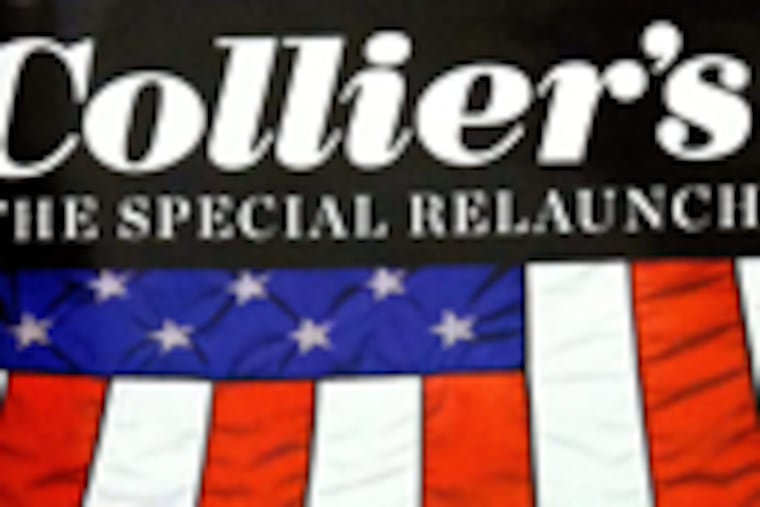Collier's magazine makes a comeback

Collier's magazine, which published Hemingway, Fitzgerald, Upton Sinclair, and other popular writers and artists, expired in 1957, killed by television and changing tastes.
Until now. A Collier's "Special Relaunch Issue" starts a subscription drive (goal: 200,000) for the reborn bimonthly by John T. Elduff, publisher at JTE Multimediain Berwyn, whose other titles include Postgraduate Medicine, Physician and Sportsmedicine, and Hospital Practice. Elduff bought Collier's two years ago at auction for $2,000.
Elduff wants to spread from doctors' offices to their waiting rooms. The big (it opens to 14 inches by 18 inches), bright, glossy 46-page issue is crowded with topical essays, decorated with light fiction and art, and framed with ads for Fort Washington's Nutrisystem weight-loss meals and fish-oil supplements. (A reborn Saturday Evening Post lite, from an Indiana publishing group, offers a similar mix, including the medical focus, plus old Norman Rockwell covers and other material from that magazine's glory years in Philadelphia.
My wife was charmed by Upstate New York writer Peter Lovenheim's thoughtful essay on neighborhoods, and so inspired by Dr. Vonda Wright's commonsense essay on aging and exercise that she dragged me on a five-mile hike. Dr. Robert Guthrie writes about statins and anticholesterol products, pro and con.
Newt Gingrich contributes a two-page primer on American values that includes a dig at Obama's "big government health-reform law." A three-page essay by lawyer-lobbyistsPaul Lowelland Nathaniel Lacktman on Florida's Medicaid reform, reprinted from an industry journal, wonkishly lists a Greek-diner menu of government subsidy programs without making clear whether this leaves participants paying more, or getting less, than before.
An essay on "Okinawa 66 Years Later" by World War II buff George Feifer attempts clunky larger points about U.S. intervention ("Are our big sticks taking us where we want to go or are we, like Perry, sowing future trouble for ourselves with them?") An adoring three-pager calls trend investor Warren "Pete" Musser"The Architect of Philadelphia Business."
The cultural back-pages excerpt includes translated passages from a French novel on F. Scott and Zelda Fitzgerald, plus an essay on Norman Mailer, and pages of John McNamara paintings and Ben Azevedo photos of Paris retouched to resemble old postcards.
Elduff has created a casually diverting magazine in the spirit of a cable entertainment channel for "active adults." I wish he'd go a long step further and reclaim Collier's history as a sponsor of "muckraking" investigative reports - and rely on that to draw readers and advertisers to support this and his next intended title, a reborn Saturday Review.
Missed payments
David Unkovic, the veteran bond lawyer Gov. Corbett assigned to keep Harrisburg paying its bills, said last week that he's skipping $5 million in general-obligation bond payments due in March as he struggles to reorganize the finances of the city, which has been crushed by debt from a failed trash incinerator and a lack of taxable property to support its schools, police, and other basic services.
The default prompted critics like Mark Schwartz, lawyer for Harrisburg's recalcitrant City Council, to predict that the city may end up in a rare Chapter 9 bankruptcy, which the state takeover was supposed to avoid.
Harrisburg is the first of 9,700 communities rated by Moody's to default on its general-obligation bonds since the 2008 credit crisis, noted Tom Kozlik, muni analyst at Janney Capital Markets in Philadelphia. He and other bond purveyors urge investors to see broke places like Harrisburg; Central Falls, R.I.; Stockton, Calif.; and Jefferson County, Ala., as "outliers" among U.S. muni issuers, and not the wave of losses to come, as other towns and counties have been able to cut spending instead of defaulting, mostly.
Cuts aside, some towns have also managed to boost taxes amid the recession - like Philadelphia, where the 2 percent state sales-tax surcharge brought in a record $24 million last month after holiday shoppers' levies made the slow trip from neighborhood cash registers to City Hall via the state's tax-collection apparatus, city controller Alan Butkovitzsaid.
Contact Joseph N. DiStefano at 215-854-5194, JoeD@phillynews.com, or d @PhillyJoeD on Twitter.